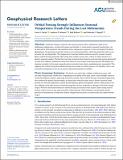Files in this item
Orbital forcing strongly influences seasonal temperature trends during the last millennium
Item metadata
| dc.contributor.author | Lücke, Lucie J. | |
| dc.contributor.author | Schurer, Andrew P. | |
| dc.contributor.author | Wilson, Rob | |
| dc.contributor.author | Hegerl, Gabriele C. | |
| dc.date.accessioned | 2021-03-11T10:30:03Z | |
| dc.date.available | 2021-03-11T10:30:03Z | |
| dc.date.issued | 2021-02-22 | |
| dc.identifier | 273262959 | |
| dc.identifier | 3afc408f-7d4d-4e05-a01b-39b4e084ecb4 | |
| dc.identifier | 000623802900049 | |
| dc.identifier | 85101407740 | |
| dc.identifier.citation | Lücke , L J , Schurer , A P , Wilson , R & Hegerl , G C 2021 , ' Orbital forcing strongly influences seasonal temperature trends during the last millennium ' , Geophysical Research Letters , vol. 48 , no. 4 , e2020GL088776 . https://doi.org/10.1029/2020gl088776 | en |
| dc.identifier.issn | 0094-8276 | |
| dc.identifier.other | Jisc: aac2f40ba1324c1da07e03e745e9cd34 | |
| dc.identifier.other | ORCID: /0000-0003-4486-8904/work/90567057 | |
| dc.identifier.uri | https://hdl.handle.net/10023/21605 | |
| dc.description | L. Lücke. was supported by a studentship from the Natural Environment Research Council (NERC) E3 Doctoral training partnership (grant number NE/L002558/1). A. P. Schurer and G.Hegerl. were supported by NERC under the Belmont forum, Grant PacMedy (NE/P006752/1). The authors acknowledge the World Climate Research Program's Working Group on Coupled Modeling, which is responsible for CMIP, and thank all the climate modeling groups for producing and making available their model output. The authors acknowledge the Northern Hemisphere Tree‐Ring Network Development (N‐TREND) and the Past Global Changes (PAGES) project for providing publicly available data. | en |
| dc.description.abstract | Insolation changes caused by the axial precession induce millennial trends in last millennium temperature, varying with season and latitude. A characteristic seasonal trend pattern can be detected in both insolation and modeled surface temperature response. In the extratropical Northern Hemisphere, the maximum insolation trend occurs around April/May, while the minimum trend occurs between July and September. The temperature trend lags behind insolation trend by around a month. Hence orbital forcing potentially affects long‐term trends in proxy data, which are often sensitive to a distinct seasonal window. We find that tree‐ring reconstructions based on early growing season dominated records show different millennial trends from those for late summer dominated proxies. The differential response is similar to that seen in pseudo proxy reconstructions when considering proxy seasonality. This suggests that orbital forcing has influenced long‐term trends in climate proxies. It is therefore vital to use seasonally homogeneous data for reconstructing multicentennial variability. | |
| dc.format.extent | 13 | |
| dc.format.extent | 3690011 | |
| dc.language.iso | eng | |
| dc.relation.ispartof | Geophysical Research Letters | en |
| dc.subject | Climate variability | en |
| dc.subject | Insolation | en |
| dc.subject | Last millennium | en |
| dc.subject | Long-term trends | en |
| dc.subject | Orbital forcing | en |
| dc.subject | Proxy reconstructions | en |
| dc.subject | GE Environmental Sciences | en |
| dc.subject | 3rd-DAS | en |
| dc.subject.lcc | GE | en |
| dc.title | Orbital forcing strongly influences seasonal temperature trends during the last millennium | en |
| dc.type | Journal article | en |
| dc.contributor.institution | University of St Andrews. School of Earth & Environmental Sciences | en |
| dc.contributor.institution | University of St Andrews. Scottish Oceans Institute | en |
| dc.contributor.institution | University of St Andrews. St Andrews Sustainability Institute | en |
| dc.identifier.doi | 10.1029/2020gl088776 | |
| dc.description.status | Peer reviewed | en |
| dc.date.embargoedUntil | 2021-02-22 | |
| dc.identifier.url | https://agupubs.onlinelibrary.wiley.com/doi/10.1029/2020GL088776#support-information-section | en |
This item appears in the following Collection(s)
Items in the St Andrews Research Repository are protected by copyright, with all rights reserved, unless otherwise indicated.

